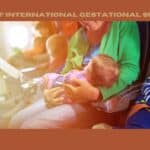I had planned to run this review last week, but held off in order to comment on the recent news on the discovery of amniotic fluid stem cells that “hold much the same promise as embryonic stem cells.” And we were even tempted today to postpone the review again so as to provide commentary on the latest hot topic in the bioethics news world, “First U. S. Uterus Transplant Planned”. But given that last week and this week the media is reporting on developing bioethics events thrust forth against the back drop of babies and pregnancy, it makes sense to send out our review of the film Children of Men in the context of these messages of infertility, pregnancy, birth and the future of the human race held in our procreative abilities.
Children of Men takes place in London, in the year 2027. For reasons that are unknown, women have stopped reproducing. It has been almost 20 years since a woman has given birth. The movie opens in the midst of political unrest and chaos, a rebel uprising against governmental anti-immigration laws, and the breaking news that the youngest living citizen has just died. It is a time of despair and hopelessness as the future of the human race is on the brink of extinction. The movie publicity states: No Children, No Future, No Hope. Bottom line, if we stop reproducing we cease to exist.
During this time, the rebels discover a young pregnant Fuji woman. This pregnant mother becomes the symbol of hope for those of the uprising as they seek to protect her and get her safely away into the hands of “the Human Project”. Fear surrounds the mother, as she knows many want to destroy her and her unborn child. The government, the rebels believe, would never acknowledge this birth and among the rebels there are those who want to use the child as their political icon while others see the child as the savior of the human race.
Children of Men naturally uses many religious references. How could it not? It would be next to impossible to talk about new life and death, despair and hope, and the future of humanity without any religious frame of reference. The movie offers one possible explanation for the mass infertility. The wrath of God has been poured out, because of our corporate sins and so God has punished us by removing his most precious gift—the gift of life. There are jokes about who the father is and whether or not this is a virgin birth. Just as Mary was the most unlikely of women chosen to usher in the coming Messiah, this Fuji woman is also an unlikely candidate chosen to preserve humanity through the fruit of her womb. The dignity of human life, as a theme, threads throughout the film and culminates with a secular nativity birth. The hope of the world lies in the procreation of the race, starting with this new baby about to be born.
Film has always been a perfect medium to communicate such profound questions about the rawness of life. Movies like GATTACA and The Island offer important commentary on how we treat people and what happens to our culture when certain practices erode the dignity of human life. Even movies like Million Dollar Baby, though we disagree with its conclusions, can force us to wrestle with complex questions about suffering, disabilities and the notion of ‘the life not worth living’.
Children of men is not so much a description of our future as it is a parable describing the often divisive, hostile, and volatile landscape surrounding the reproductive woman of today. For nearly 5 decades now the majority of issues that have created the most heated of debates, starting with the introduction of the Pill to the current Cloning crisis, have completely transformed the way we think about reproduction. Some might even say there is reason to despair as the world jumps on the Cloning bandwagon. But I think there is reason for hope. The somewhat disjointed and raw tale of Children of Men, at moments, served to focus my attention on the beauty of life itself, and maybe that’s a good starting point for giving us hope for our future.
Author Profile

- Jennifer Lahl, MA, BSN, RN, is founder and president of The Center for Bioethics and Culture Network. Lahl couples her 25 years of experience as a pediatric critical care nurse, a hospital administrator, and a senior-level nursing manager with a deep passion to speak for those who have no voice. Lahl’s writings have appeared in various publications including Cambridge University Press, the San Francisco Chronicle, the Dallas Morning News, and the American Journal of Bioethics. As a field expert, she is routinely interviewed on radio and television including ABC, CBS, PBS, and NPR. She is also called upon to speak alongside lawmakers and members of the scientific community, even being invited to speak to members of the European Parliament in Brussels to address issues of egg trafficking; she has three times addressed the United Nations during the Commission on the Status of Women on egg and womb trafficking.
Latest entries
 infertilityApril 23, 2024The Rise of International Gestational Surrogacy in the U.S.
infertilityApril 23, 2024The Rise of International Gestational Surrogacy in the U.S. Assisted Reproductive TechnologyApril 16, 2024Founder Jennifer Lahl’s Speech on Surrogacy to the Casablanca Declaration
Assisted Reproductive TechnologyApril 16, 2024Founder Jennifer Lahl’s Speech on Surrogacy to the Casablanca Declaration #BigFertilityFebruary 27, 2024No, Alabama Didn’t Ban IVF
#BigFertilityFebruary 27, 2024No, Alabama Didn’t Ban IVF ArticleSeptember 25, 2023The Little Engine That Could
ArticleSeptember 25, 2023The Little Engine That Could

